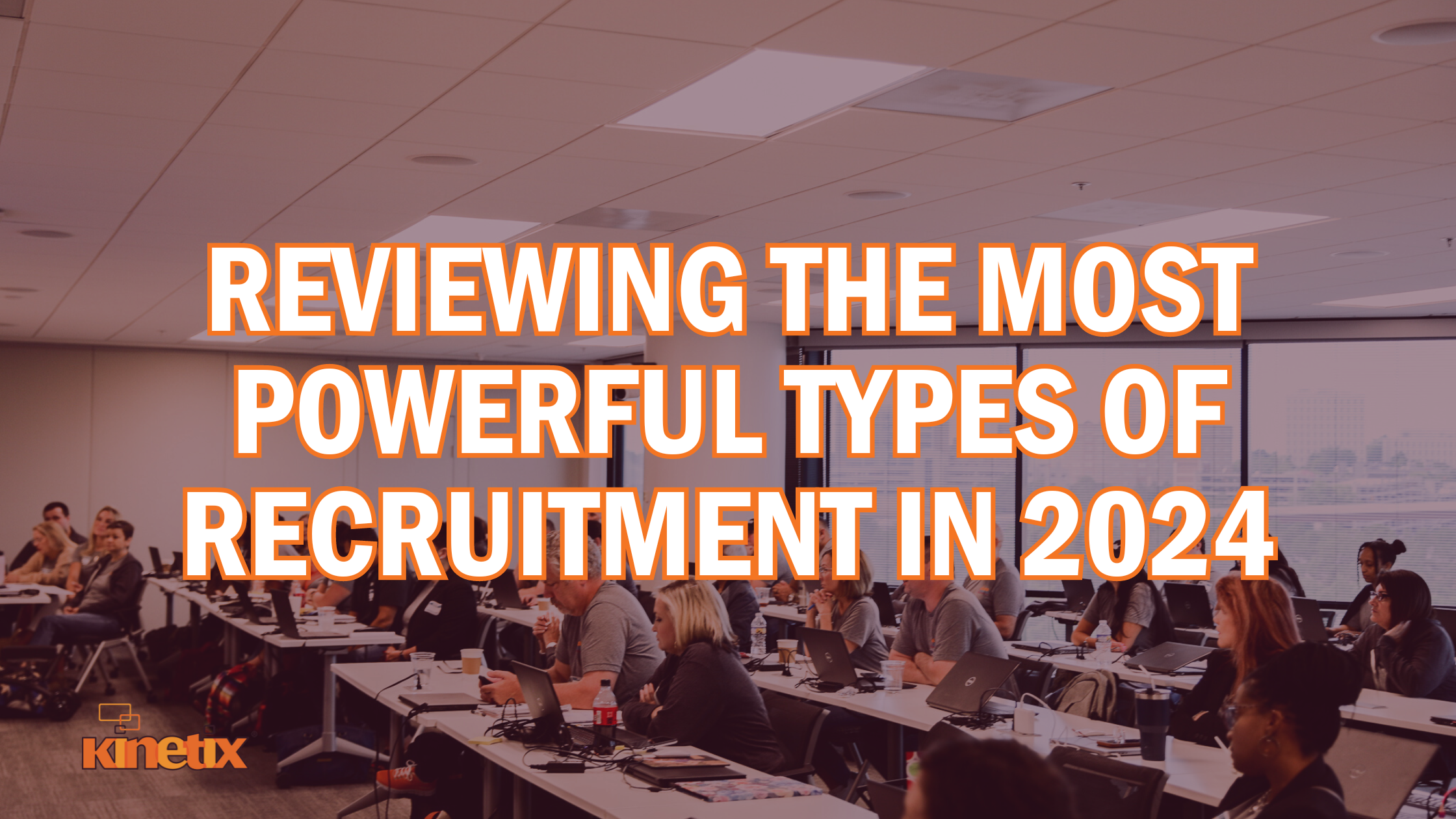
In an increasingly challenging hiring market, many businesses are feeling the pressure to adapt their recruitment strategies. Navigating a landscape where finding the right talent is more complex than ever, companies are turning their attention to innovative solutions.
This shift is driven by the need to overcome obstacles in the current job market and secure the best candidates in a competitive environment.
This blog delves into various types of recruitment methods, examining the pros and cons of each approach.
Our goal is to provide you with a comprehensive understanding of these methods, helping you make informed decisions about which recruitment strategies best align with your business objectives.
Recruitment Process Outsourcing (RPO) Explained
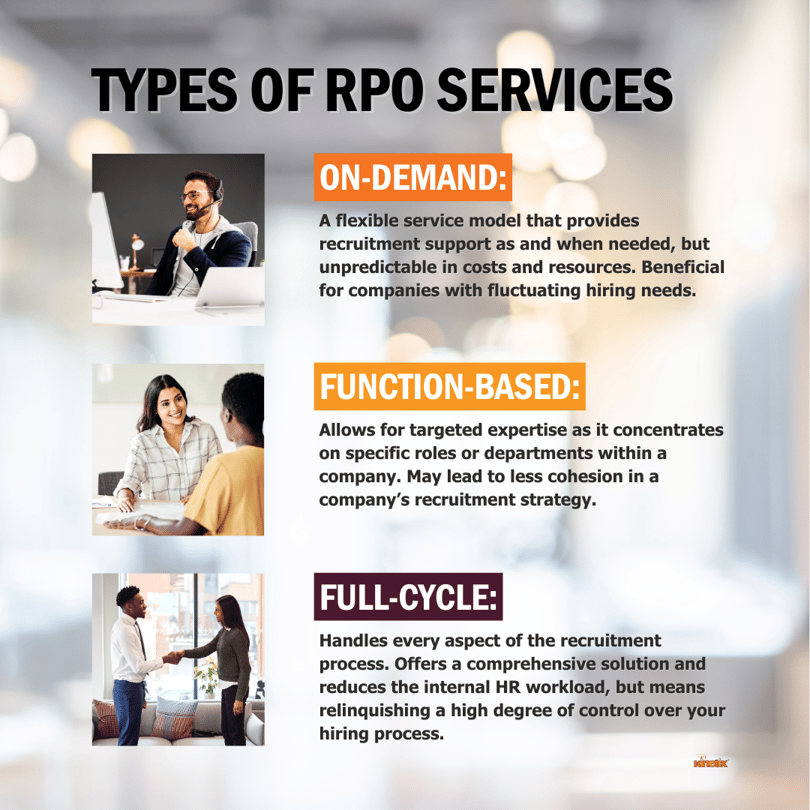
Recruitment Process Outsourcing (RPO) represents a strategic partnership where a business outsources its entire or part of it’s recruitment process to a specialized provider.
This comprehensive solution is ideal for companies seeking an efficient, adaptable, and cost-effective approach to talent acquisition.
Benefits of RPO
Enhances Employer Branding
One of the ways RPO improves hiring efficiency is by bolstering your employer's brand.
By aligning recruitment strategies with your company's vision and culture, RPO providers help project a strong, positive image to potential candidates.
This strategic approach to branding in the hiring process enhances your appeal in the job market, attracting higher-quality candidates.
Streamlines Recruitment & Hiring Processes
RPO simplifies everything from job posting ads and background checks to interviewing suitable candidates, allowing companies to fill positions quicker and with less hassle.
Wide Range of Candidates
Access to a large pool of talent is provided, helping businesses to source candidates for their jobs more easily, including those with rare skills or in high demand.
Cost-Effective
Cheaper than managing hiring internally, RPO reduces the need for a big in-house recruitment team and cuts down on advertising costs. This makes it a budget-friendly option for many businesses.
Common RPO Models
The core strength of Recruitment Process Outsourcing lies in its adaptability, making it a versatile solution for a wide range of hiring challenges.
Different RPO models are tailored to meet specific recruitment needs, ensuring each business can find a strategy that aligns perfectly with its unique hiring scenarios.
- End-to-End RPO: This model handles the entire recruitment process from job requisition to onboarding.
- On-Demand RPO: Tailored for short-term or project-based hiring needs, providing flexible support as required.
- Selective RPO: Focuses on specific stages of the recruitment process, such as candidate sourcing or interview management.
- Project-Based RPO: Ideal for specific recruitment campaigns or to address immediate hiring surges within a set timeframe.
- Enterprise RPO: Designed for large-scale, organization-wide recruitment needs, often involving strategic planning and long-term talent acquisition.
Ideal Scenarios for RPO
Scenario |
Advantage/Example |
|
Rapid Company Growth |
RPO can quickly scale up recruitment efforts to meet growing demands, ensuring timely and efficient staffing. |
|
High-Volume Hiring |
Effectively manages bulk hiring, leveraging extensive networks and streamlined processes. |
|
Specialized Skill Requirements |
Access to specialized recruiters and a wider talent pool to meet niche skill requirements. |
|
Structural Changes |
Provides flexible recruitment solutions during organizational restructuring, minimizing disruptions. |
|
Reducing Recruitment Costs |
Streamlines the hiring process, reducing overhead and operational costs associated with recruitment. |
|
Improving Quality of Hires |
Enhances candidate quality through comprehensive screening and vetting, leading to lower turnover rates. |
Direct Hire Staffing Explained
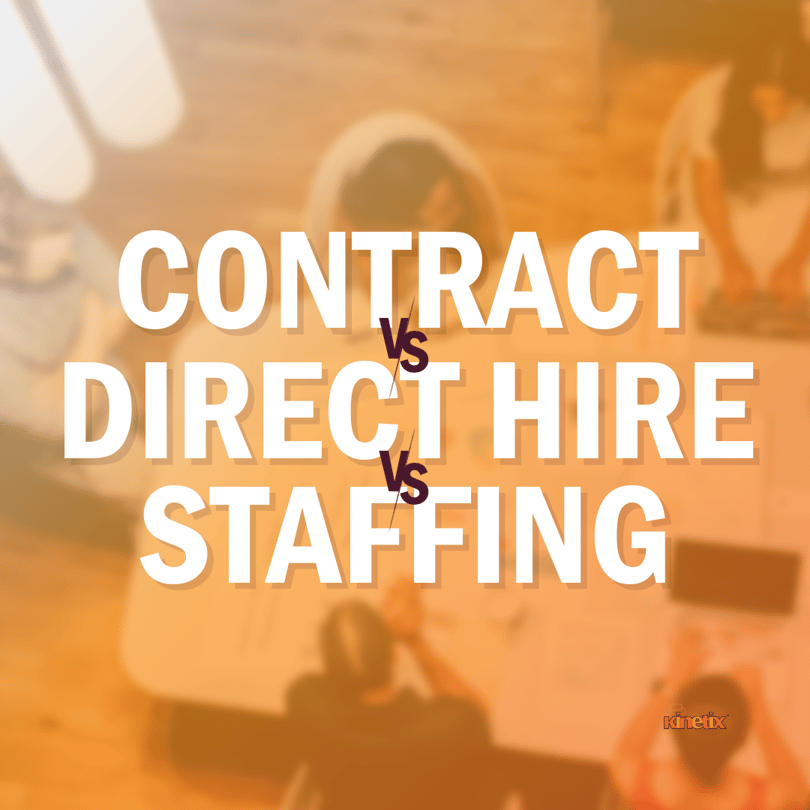
Direct Hire refers to a recruitment process where companies partner with a staffing agency to find and hire candidates directly onto their payroll for permanent positions.
This method is distinct from temporary or contract staffing, focusing on long-term, stable employment.
Key Features of Direct Hire
Direct Hire services are a strategic solution for companies looking to make significant, long-term additions to their team.
They provide a more focused approach to recruitment, ensuring that new hires are fully aligned with the company’s objectives and culture.
Permanent Employment Focus
Direct Hire is designed for companies seeking to fill permanent roles, providing a stable workforce for long-term growth. This method is particularly beneficial for businesses that prioritize continuity and want to avoid the frequent turnover associated with temporary staffing.
Cultural & Skill Fit
The success of Direct Hire lies in its ability to match candidates who not only meet the required skill set but also resonate with the company's culture. This dual focus ensures that new hires are well-equipped to contribute to the company’s goals and integrate seamlessly into the existing team.
In-Depth Candidate Screening
Direct Hire involves a thorough vetting process that goes beyond skill assessment to include personality, work ethic, and cultural compatibility. This comprehensive approach ensures that candidates are not just qualified but are the right fit for the company’s long-term vision and team dynamics.
Direct Hire vs Traditional Staffing
Feature |
Direct Hire |
Traditional Staffing |
|
Type of Employment |
Focused on long-term, permanent positions. |
Typically used for temporary or contract roles. |
|
Candidate Fit |
Prioritizes cultural alignment and long-term fit. |
Often more focused on immediate skill match. |
|
Recruitment Process |
In-depth, personalized approach to sourcing. |
Generally a faster, more transactional process. |
|
Commitment |
Aimed at integrating employees into the company’s core team. |
Designed for short-term employment needs. |
|
Cost Structure |
Investment in a long-term employee, potentially higher upfront cost but lower turnover. |
Lower upfront cost but may lead to higher long-term costs due to turnover. |
|
Role Impact |
Ideal for filling key roles that drive business success. |
Often used for filling gaps or short-term needs. |
|
Employer Branding |
Enhances employer branding by showing commitment to long-term hires. |
Less impact on employer branding due to short-term nature of roles. |
When Direct Hire Works Best
- Long-Term Positions: Ideal for jobs that offer security and are expected to last for a long time.
- High-Value Roles with Special Skills: Great for jobs that need specific skills or knowledge.
- Leadership Positions: Suitable for hiring managers or leaders who will shape the company's future.
- Roles with a Direct Impact on Business: For jobs that are critical to the company's success or operations.
- Niche or Hard-to-Fill Roles: Useful for positions that are unique or not easy to fill with standard recruitment methods.
Recruitment as a Service Explained
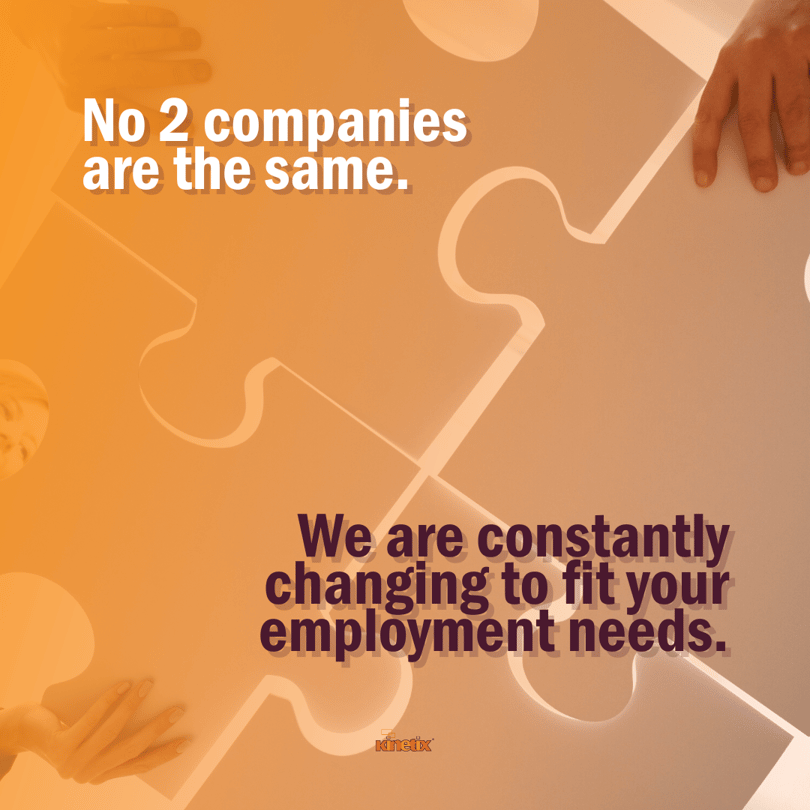
What is RaaS?
Recruitment as a Service (RaaS) is a modern recruitment model that offers flexible, subscription-based hiring solutions. It provides businesses with tailored recruitment support, aligning with their specific needs and fluctuating hiring demands.
This service typically includes a range of recruitment activities, from sourcing and screening candidates to managing the interview process and assisting with onboarding.
RaaS is particularly beneficial for organizations seeking to augment their recruitment capabilities with external expertise, offering a cost-effective and adaptable approach to talent acquisition.
Key Components of RaaS
These features make RaaS an increasingly popular choice for businesses looking for a flexible, efficient, and strategic approach to recruitment.
- On-Demand Subscription Model: RaaS operates on a customizable subscription basis, allowing businesses to choose the level of service that best fits their needs and budget.
- Scalability: This model is highly adaptable, enabling companies to scale their recruitment efforts up or down in response to their changing hiring requirements.
- Comprehensive Recruitment Support: It covers various aspects of the recruitment process, including job posting, candidate sourcing, screening, interviewing, and onboarding.
- Enhanced Candidate Quality: With a focus on tailored recruitment strategies, RaaS ensures a higher quality of candidates that are a good fit for the company’s culture and requirements.
When to Consider Recruitment as a Service
Scenario |
Description |
|
Project-Based Needs |
Ideal for when a company has short, specific projects and needs specialized skills temporarily. |
|
Rapidly Changing Industries |
In sectors where the demand for talent can shift quickly, RaaS provides the agility to adapt. |
|
During Business Expansion |
Crucial for companies in growth phases needing to scale their workforce effectively. |
|
For Seasonal Peaks |
Useful in industries like retail or tourism, where staffing needs increase dramatically during certain times of the year. |
|
Startup Flexibility |
Startups, often with fluctuating needs, can benefit from the scalability of RaaS, adjusting their workforce as their business evolves. |
|
Budget Constraints |
Companies with tight budgets can use RaaS to access top talent without the overhead of full-time hires. |
Exploring Other Types of Recruitment Strategies
.png?width=810&height=810&name=Nov%2023%20Social%20Posts%20(1).png)
- Contingent Recruitment: This strategy involves hiring candidates on a non-permanent basis, often used for meeting temporary or project-specific needs. Payment to the recruitment agency is made only upon successful placement.
- Executive Search: Specialized in sourcing high-level executives and C-suite leaders, focusing on strategic roles essential for organizational leadership and direction.
- Temp-to-Perm (Temporary-to-Permanent): Candidates are initially hired on a temporary basis with the potential to become permanent employees based on performance and company requirements.
- Freelance/Contractor Staffing: Geared towards short-term or project-based work, this method is common in creative, IT, and consultancy sectors, where expertise for specific projects is required.
- Traditional Staffing: Geared towards short-term or project-based work, this method is common in creative, IT, and consultancy sectors, where expertise for specific projects is required.
Types of Recruitment Firms & Agencies
The type of recruitment agency you choose should reflect the needs and proclivities of your industry. Here’s an overview of the most common types of external recruiters.
Type of Recruitment Firm/Agency |
Description |
|
RPO Providers (Recruitment Process Outsourcing) |
Offers comprehensive recruitment services, managing the entire lifecycle. Some, like Kinetix, also provide customizable solutions like RaaS for on-demand needs. |
|
Generalist Recruitment Firms |
Cater to a wide range of industries and job functions, suitable for businesses with diverse hiring needs. |
|
Specialist or Niche Recruitment Agencies |
Focus on specific sectors or job types, like IT, healthcare, finance, offering in-depth industry knowledge for specialized roles. |
|
Executive Search Firms (Headhunters) |
Specialize in recruiting high-level executives and senior management, using proactive methods to approach passive candidates. |
|
Staffing or Temp Agencies |
Provide temporary workers for short-term assignments or contract work, ideal for project-based work or seasonal peaks. |
|
Freelancer Platforms and Contract Recruiter Agencies |
Specialize in providing freelance or contract recruiters to businesses for specific projects or to augment in-house teams. |
Tips for Selecting the Right Recruitment Model
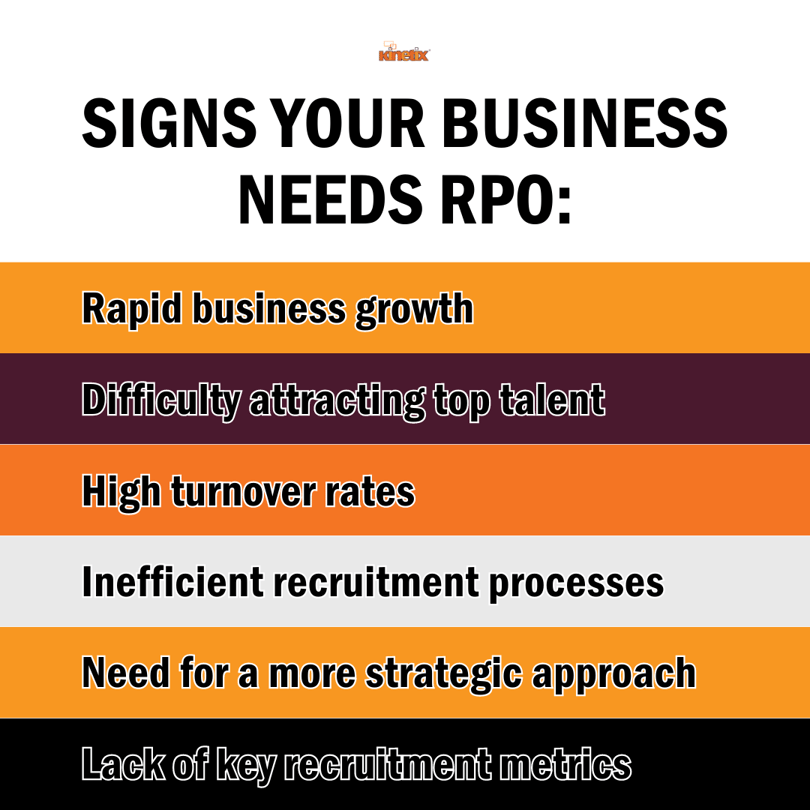
By considering these factors, you can select a recruitment model that not only meets your immediate hiring needs but also aligns with your broader business strategy and cultural ethos.
Assess Your Hiring Needs
Analyze the nature of the roles you need to fill. Are they temporary, permanent, at an executive level, or require specialized skills? Understanding these aspects will help in selecting a model that caters to the specific skill sets and experience levels required.
Consider Business Size and Structure
The size and organizational structure of your business play a significant role in determining the right model. Smaller, more dynamic companies may find flexible solutions like RaaS suitable, while larger enterprises might benefit from the structured approach of RPO or Direct Hire for their ongoing recruitment needs.
Budget Constraints
It's essential to have a clear understanding of your recruitment budget. Different models come with various cost implications. Opt for a model that fits within your financial framework without compromising on the quality of hires.
Urgency and Timeframes
Assess how quickly you need to fill the positions. If immediacy is a key factor, models like Contingent Recruitment can expedite the process. For less urgent needs, you might consider more comprehensive models that focus on strategic alignment and cultural fit.
Long-Term Business Goals
Your recruitment strategy should support your long-term business objectives. Consider how the chosen model can facilitate future growth and adapt to evolving business needs.
Company Culture and Values
The recruitment model should resonate with your company’s culture and values. This alignment is critical for ensuring employee satisfaction and retention, and for attracting candidates who will thrive in your organizational environment.
Recruitment Models Comparison |
|||||
Recruitment Model |
Flexibility |
Cost-Effective |
Ideal Business Size |
Speed of Hiring |
Best for: |
|
RPO |
High |
Yes |
Large |
Medium to Fast |
Bulk hiring, Specialized roles |
|
Direct Hire |
Low |
Medium |
Medium to Large |
Slow |
Permanent, Stable roles |
|
RaaS |
Very High |
High |
Any, especially Startups |
Fast |
Variable needs, Project-based |
|
Contingent Recruitment |
High |
Yes |
Any |
Fast |
Short-term, Immediate needs |
|
Executive Search |
Low |
High |
Medium to Large |
Slow |
Senior, High-value roles |
|
Temporary-to-Permanent |
Medium |
Yes |
Any |
Medium |
Trial periods, Uncertain long-term needs |
What’s The Right Recruitment Approach?
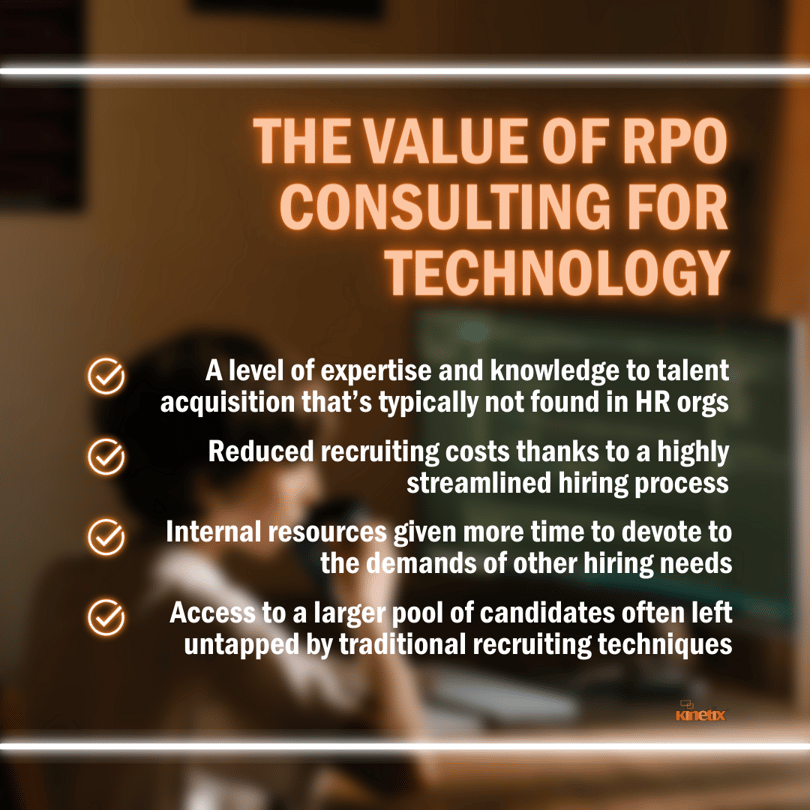
Do you have a hiring project you could use some expertise on? We specialize in helping businesses maximize their recruitment outcomes.
Get in touch with our team today. We’ll be happy to suggest a strategy (even if it’s not our own) to help you find and retain the talent you need for success.
